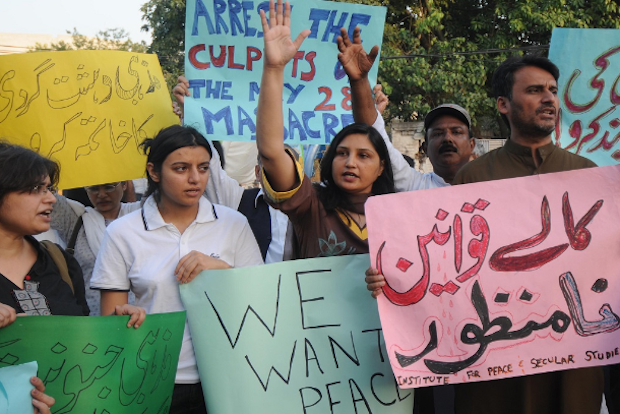The task force, which has come to light more than six years after the Supreme Court forced its constitution, has already drawn criticism.
![Pakistani Prime Minister Imran Khan chairs a cabinet meeting on May 5 at which the minorities commission was approved. / [link]Ucanews[/link].](https://cms.evangelicalfocus.com/upload/imagenes/5ebaab33d0514_Pak.png) Pakistani Prime Minister Imran Khan chairs a cabinet meeting on May 5 at which the minorities commission was approved. / [link]Ucanews[/link].
Pakistani Prime Minister Imran Khan chairs a cabinet meeting on May 5 at which the minorities commission was approved. / [link]Ucanews[/link].
Pakistan has announced the establishment of the National Commission for Religious Minorities (NCM), six years after the Supreme Court ruled on its constitution, as a part of the sentence for the explosion of a bomb in a church in Peshawar.
Chela Ram Kewlani, a Hindu member of the ruling Pakistan Justice party from Sindh province, has been named the commission’s chairman. The other two Hindu members are Jaipal Chhabria and Vishno Raja Qavi.
Bishop Sebastian Shaw of Lahore, Albert David, chairman of the Pakistan Christian United Movement, and Sarah Safdar, diocesan secretary of the Church of Pakistan’s Peshawar Diocese, will be the three representing the Christian community.
Two Muslim clerics, two Sikh members and one member each from the Parsi and Kelash communities complete the group.
The United States Commission on International Religious Freedom (USCIRF) has welcomed the establishment of Pakistan’s National Commission for Minorities, as “an important step in Pakistan’s continuing journey towards the protection of religious freedom”.
Pakistan ranks 5th in Open Doors World Watch List. According to the organization, the state "systematically attacks Christians and isolates them from the rest of the population" with measures such as the law againt blasphemy, which led to the conviction in the Asian Bibi.
The new Commission has been critisised for having left out the Ahmadiyya community, a religious group related to Islam but considered a cult by the government and the main Muslim leaders in the country.
“The Pakistani constitution considers them non-Muslims. If they want to avail constitutional rights they must accept the constitution first”, state Minister for Parliamentary Affairs Ali Muhammad Khan, told news agency Reuters. Pakistan’s Ministry of Religious Affairs, Pir Noor ul Haq Qadri, also said Ahmadis should not be included in the commission “given the religious and historical sensitivity of the issue”.
“Keeping Ahmadis off the commission is absurd and shows the extent to which the community faces discrimination every day”, said Brad Adams, Asia director of NGO Human Rights Watch.
Adams pointed out that “Pakistan needs an independent and inclusive national human rights institution, and not an exclusionary government-controlled one”.
Minority groups including Catholics denounced the proposed commission as “toothless and sham”. In a joint statement on May 2, they stressed that “setting up yet another body without powers and resources will defeat the purpose, therefore we reject this tokenism”.
Meanwhile, Albert David, chairman of the Pakistan Christian United Movement and one of the three that will be representing the Christian community, underlined that “we will sit with other members and discuss the way forward”, the Asian Catholic news website Ucanews reported. “But we fully understand there are huge expectations from the Christian community and we will try to live up to them”, he added.

The other big criticism has focused on the way in which the commission was finally established and its character.
According to the Pakistani newspaper The Express Tribune, Shoaib Suddle, director of the Commission for the constitution of the minorities’ rights has informed the Supreme Court that the NCM “is not in line with the body envisaged by the top court in its historic 2014 judgement”.
The Commission was established by the Supreme Court in January 2019, to implement the 2014 verdict for the protection of minorities’ rights. It prepared a draft bill for establishing the council, with “the collaboration of several stakeholders including the civil society”
The draft was was sent to the religious affairs ministry and ready to be presented before parliament, however, the ministry did not provide any feedback to the commission, and presented a different document, which “did not comply with the government’s international commitments”, Suddle informed the Supreme Court.
Peter Jacob, Executive Director of the Centre for Social Justice (CSJ) and chairperson of the Peoples Commission on Minority Rights (PCMR), denounced the same in a press conference.
“In its submission to the Supreme Court of Pakistan on February 19, 2020, the Ministry for Religious Affairs noted that the NCM will be constituted through an Act of Parliament. However, the cabinet did exactly the opposite by approving the creation of an ad-hoc committee”, Jacob said.
The Human Rights Commission of Pakistan (HRCP) also has “strong reservations concerning the formation of a national minorities’ commission through a Cabinet decision based on a summary moved by the Ministry of Religious Affairs and Interfaith Harmony”.
“The proposed composition smacks of partisanship and, above all, as a non-statutory body, the commission is no substitute for the national council for minorities’ rights envisioned by the Supreme Court’s historic Tasadduq Jillani judgement of 2014”, it stated.
The creation of the National Commission for Religious Minorities has also not been welcomed by the ultra-conservative Sunni group of Jamaat Ahle Sunaat, who threatened to “stage protests” if the Pakistan government does not accept his 18-point list of demands “for the protection of prophetism, tightening the restrictions of religious minorities in the country”.

Las opiniones vertidas por nuestros colaboradores se realizan a nivel personal, pudiendo coincidir o no con la postura de la dirección de Protestante Digital.
Si quieres comentar o